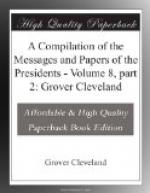clear that by the use of the means necessary to their
execution some single law, made in such extreme tenderness
of the citizen’s liberty that practically it
relieves more of the guilty than of the innocent, should
to a very limited extent be violated? To state
the question more directly, Are all the laws
but
one to go unexecuted, and the Government itself
go to pieces lest that one be violated? Even
in such a case, would not the official oath be broken
if the Government should be overthrown when it was
believed that disregarding the single law would tend
to preserve it? But it was not believed that
this question was presented. It was not believed
that any law was violated. The provision of the
Constitution that “the privilege of the writ
of
habeas corpus shall not be suspended unless
when, in cases of rebellion or invasion, the public
safety may require it” is equivalent to a provision—is
a provision—that such privilege may be
suspended when, in cases of rebellion or invasion,
the public safety
does require it. It was
decided that we have a case of rebellion and that the
public safety does require the qualified suspension
of the privilege of the writ which was authorized
to be made. Now it is insisted that Congress,
and not the Executive, is vested with this power;
but the Constitution itself is silent as to which
or who is to exercise the power; and as the provision
was plainly made for a dangerous emergency, it can
not be believed the framers of the instrument intended
that in every case the danger should run its course
until Congress could be called together, the very
assembling of which might be prevented, as was intended
in this case, by the rebellion.
No more extended argument is now offered, as an opinion
at some length will probably be presented by the Attorney-General.
Whether there shall be any legislation upon the subject,
and, if any, what, is submitted entirely to the better
judgment of Congress.
The forbearance of this Government had been so extraordinary
and so long continued as to lead some foreign nations
to shape their action as if they supposed the early
destruction of our National Union was probable.
While this on discovery gave the Executive some concern,
he is now happy to say that the sovereignty and rights
of the United States are now everywhere practically
respected by foreign powers, and a general sympathy
with the country is manifested throughout the world.
The reports of the Secretaries of the Treasury, War,
and the Navy will give the information in detail deemed
necessary and convenient for your deliberation and
action, while the Executive and all the Departments
will stand ready to supply omissions or to communicate
new facts considered important for you to know.




